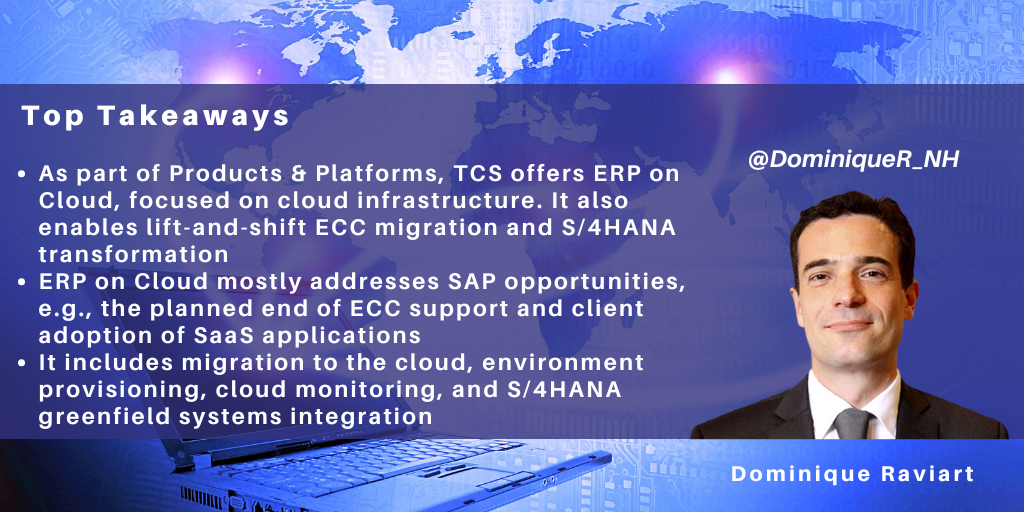Search posts by keywords:
Filter posts by author:
Related Reports
Related NEAT Reports
Other blog posts
posted on Sep 03, 2024 by Dominique Raviart

We recently talked with TCS about its ERP on Cloud offering. The SAP ecosystem has been going through intense change, with the planned end of SAP ECC support from December 31, 2027, and transformation with S/4HANA and recent Clean Core SAP initiatives. The change is driving accelerated ERP adoption, as demonstrated by SAP’s increasing revenue growth driven by SaaS applications. To accommodate this increased pace of change, TCS recently amended its ERP on Cloud offering.
TCS has positioned ERP on Cloud at the intersection of SAP cloud infrastructure and application services with bundled services. The offering is firmly focused on the cloud infrastructure with, for instance, migration of SAP ECC to the cloud targeting hosting modernization. ERP on Cloud also comprises the provisioning of development and test environments, as well as monitoring. It also bridges with application services and S/4HANA systems integration/transformation services. While the focus is on SAP opportunities, TCS also offers related services for other ERP and custom application production environments.
TCS’ ERP on Cloud offering is part of TCS’ Products and Platforms. While TCS’ IP investment is known for its software product portfolio, it also hosts offerings such as ERP on Cloud, i.e., bundled application and cloud infrastructure services, targeting large enterprises and the mid-market.
TCS’ immediate priority for ERP on Cloud is to scale the offering. The growth opportunity is significant, fueled by the end of ECC support and the S/4HANA transformation. The growth is also necessary to help TCS continue bringing automation across its various ERP on Cloud offerings and lowering costs.
Four Specialized Offerings
TCS’s flagship offering is around SAP migration to the cloud. With this offering, the company offers a lift-and-shift migration. The offering is technical, targeting the migration of databases and OS. Common client scenarios for this offering include organizations facing middleware that is no longer supported by their respective ISVs. The company highlights the IP’s scalability and that it can accommodate any middleware. TCS provides the necessary middleware refresh, minimizing client investment while benefiting from cloud hosting and hyperscaler innovation.
TCS started its ERP on Cloud journey with environment provisioning, whether for SAP PoCs, development and testing, specific usages such as document archival, or even large production environments. TCS has worked on accelerating instances deployment on the cloud and has pre-installed cloud templates to provision SAP Basis. With the rise of FinOps, TCS promotes a right-sizing approach to control spending while reaping the benefits of public cloud.
Complementing its lift-and-shift migration to the cloud offering, TCS offers greenfield S/4HANA transformation. The company provides pre-configured templates with ~120 standard processes to accelerate the deployment. Most processes support back-office functions (e.g., order to cash, procure to pay). They also address several industry-specific templates for processes in discrete manufacturing sectors (e.g., plan to produce, quality management, maintenance management). TCS has also localized these templates for several countries, including U.S., U.K., India, UAE, China, and Indonesia. TCS estimates that this offering helps to reduce implementation, targeting 16 weeks of deployment time. For this offering, TCS is an SAP-Qualified Partner-Packaged Solutions, targeting the mid-market with its pre-configured templates.
TCS also provides SAP environment monitoring and management. The company has its TCS Enterprise Manager IP for multi-cloud application and cloud infrastructure monitoring, also integrating with ITSM tools (e.g., ServiceNow). TCS is investing significantly in automation with AI, deploying SAP updates automatically, and conducting production data and ITSM pattern analysis. TCS Enterprise Manager is ERP on Cloud’s fastest-growing offering. Client demand is SAP-centric, but expanding to other ERP platforms and custom applications, filling an application monitoring market gap.
The Road Ahead
Naturally, TCS is looking for additional productivity gains and automation to reduce costs further; accordingly, it is investing in automation and has grouped its IP and automation efforts under the ERP Enablers category. An example of a recent investment includes a library of IaC configuration files to provision cloud instances. Another example is a data migration and source and target validation tool dealing with a heterogeneous set of now unsupported databases.
Geographic expansion is also a priority. The current SAP momentum should help. Organizations are accelerating their transition, whether lift-and-shift or transformation. They require a standard and industrialized service to mitigate risk in the context of tight budgets. TCS’ emphasis on innovation and service repeatability should help.
